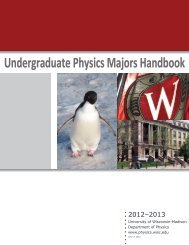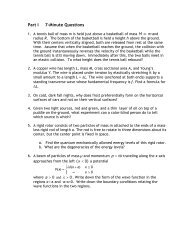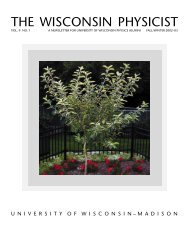Grad Student handbook - Department of Physics - University of ...
Grad Student handbook - Department of Physics - University of ...
Grad Student handbook - Department of Physics - University of ...
Create successful ePaper yourself
Turn your PDF publications into a flip-book with our unique Google optimized e-Paper software.
Research and Your Advisor<br />
The Ph.D. is a research degree and is awarded for substantial original research, presented<br />
in the form <strong>of</strong> a dissertation. The requirements listed above are for the purpose <strong>of</strong><br />
expediting the student’s contribution to research in physics.<br />
The responsibility to acquire (choose and be accepted by) a major pr<strong>of</strong>essor (advisor)<br />
is entirely with the student. Acceptance for Ph.D. research by a pr<strong>of</strong>essor depends on<br />
the pr<strong>of</strong>essor’s appraisal <strong>of</strong> the student’s potential for research and on the ability <strong>of</strong> the<br />
pr<strong>of</strong>essor to accept a student at that time. Usually the major pr<strong>of</strong>essor will be able to<br />
<strong>of</strong>fer support in the form <strong>of</strong> a research assistantship, but this is not always the case, and<br />
occasionally a student may need to work as a teaching assistant while performing thesis<br />
research. A weekly “Introductory Seminar” is held in the fall semester to aid the student in<br />
the choice <strong>of</strong> research area and major pr<strong>of</strong>essor. During the seminars, pr<strong>of</strong>essors from each<br />
<strong>of</strong> the research groups describe their research, show their laboratories, and discuss matters <strong>of</strong><br />
general interest to graduate students. First-year students are expected to attend these seminars.<br />
<strong>Grad</strong>uate students should begin research work as early as possible. <strong>Student</strong>s are<br />
encouraged to acquire a major pr<strong>of</strong>essor and begin research by the end <strong>of</strong> the second<br />
semester. Summer is the ideal time to begin research unencumbered by course work or<br />
teaching.<br />
Preliminary Examination<br />
The Preliminary Examination (Prelim) must be passed for admission to candidacy for<br />
the Ph.D. (dissertator status). The exam will test whether the student has mastered the<br />
physics and technology necessary to perform research in the chosen field. The Prelim must<br />
be taken no later than the end <strong>of</strong> the fifth semester in the program. An extension may be<br />
granted by the <strong>Department</strong> Chair for a single semester for extenuating circumstances. If<br />
the Prelim is failed the first time, it may be repeated once and it must be passed before<br />
the end <strong>of</strong> the sixth semester. Before, or soon after passing the Qualifying Examination,<br />
the student should identify an area <strong>of</strong> research and choose a major pr<strong>of</strong>essor who will<br />
act as chair <strong>of</strong> the student’s Preliminary Examination Committee. The format <strong>of</strong> the<br />
examination is left to the major pr<strong>of</strong>essor (subject to approval by the <strong>Department</strong>al Prelim<br />
Committee). Ordinarily, the exam begins with a 1-hour presentation covering a subject in<br />
the student’s chosen area <strong>of</strong> research. The presentation is then followed by a questionand-answer<br />
period intended to assess the student’s background knowledge and research<br />
potential.<br />
For each PhD student, a thesis committee, consisting <strong>of</strong> the student’s advisor and two<br />
additional faculty members chosen by the student’s advisor, is assembled at the time<br />
<strong>of</strong> the Preliminary Examination. The committee is augmented by one member <strong>of</strong> the<br />
<strong>Department</strong>al Prelim Committee for the Preliminary Examination. The thesis committee<br />
remains standing for the duration <strong>of</strong> the student’s dissertation work. It judges the student<br />
on the Preliminary Examination, provides advice during the dissertation work, and judges<br />
the PhD final oral examination. A student planning to take the Preliminary Examination<br />
will need to obtain a Minor Agreement Form and a Preliminary Examination Warrant<br />
Request form from the <strong>Grad</strong>uate <strong>Student</strong> Coordinator at least three weeks prior to the<br />
date <strong>of</strong> the examination. A warrant from the <strong>Grad</strong>uate School is required before taking<br />
the Preliminary Examination. The warrant will not be issued if the student has any grade<br />
<strong>of</strong> “Incomplete.” It is the responsibility <strong>of</strong> the student to check with the <strong>Grad</strong>uate <strong>Student</strong><br />
Coordinator to ensure that such a grade does not appear on the record.<br />
14 | Handbook for <strong>Grad</strong>uate <strong>Student</strong>s in <strong>Physics</strong> 10142011


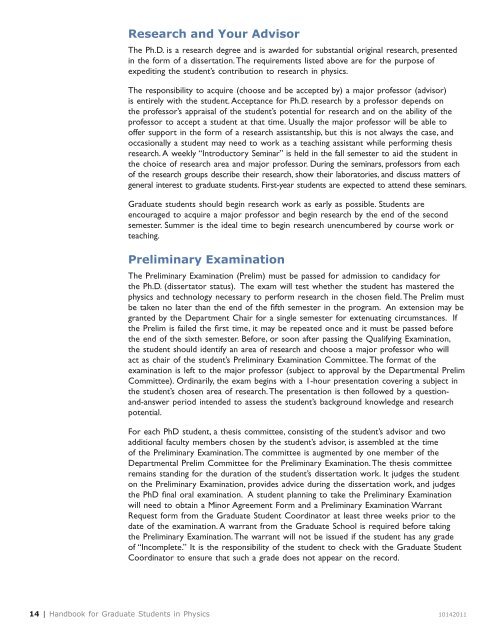
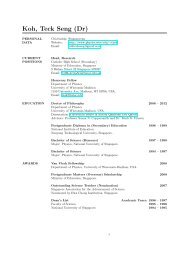
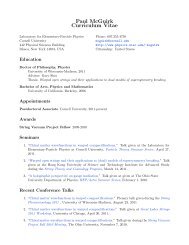

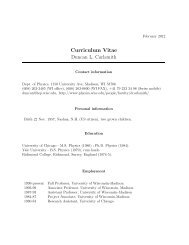

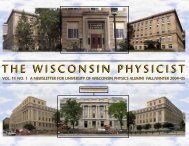
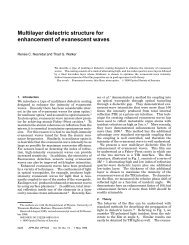
![The Symmetric Linear Potential [ ]](https://img.yumpu.com/25329322/1/190x245/the-symmetric-linear-potential-.jpg?quality=85)

